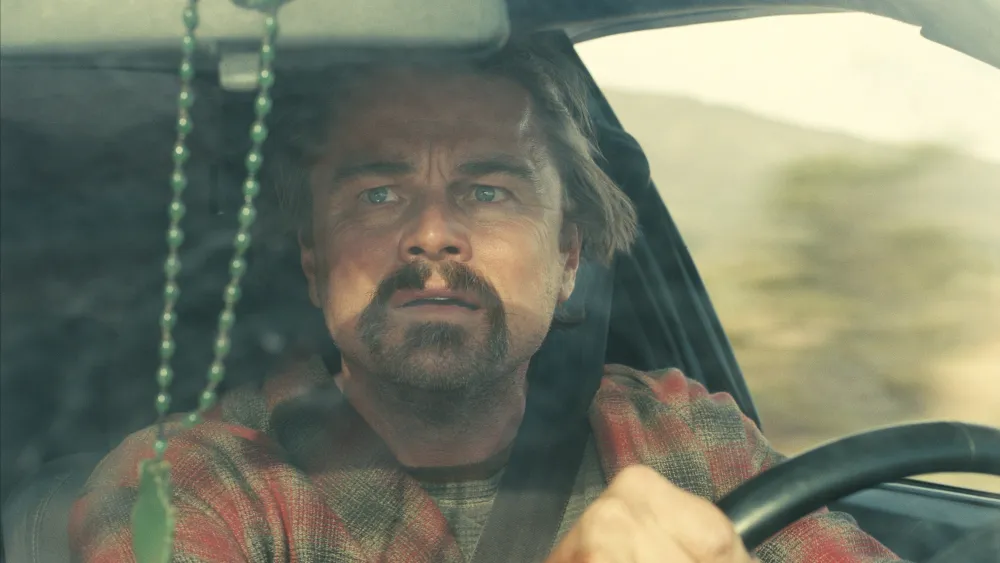
There’s no one way to measure when a movie enters the cultural bloodstream — I mean, when it does that as powerfully as a shot of heroin. But when it happens, you can feel it. It used to happen a lot, but it’s rarer in the world we live in today, which is awash in a universe of content, most of it splintered into separate silos. The phrase “mass culture” used to be synonymous with “hit television” or “blockbuster movie,” but even those things aren’t the dominating, all-eyes-on-this, collective-attention-grabbing forces they once were. All of which makes Paul Thomas Anderson’s “One Battle After Another” a grand throwback, the all-too-rare movie that has the chance to dominate the cultural conversation.
Let’s be clear about why that could happen. “One Battle After Another” is a movie that connects with the moment we’re in like nothing you’ve seen — and the moment we’re in is like nothing you’ve seen. As the United States gets pushed, day by day, closer and closer to autocracy, that’s a situation that ought to be setting everyone in the country on edge. Yet it’s part of the nature of autocracy to narcotize people into numbness, delusion, fear, and a kind of self-perpetuating apathy. And that’s what seems to be happening in America right now. Gavin Newsom shouldn’t be the only one saying that we’re in danger of not having real elections in 2028; tons of people (leaders, citizens, journalists) should be saying it. But too many of us are caught in a zone halfway between resistance and despair, and that’s the mood that “One Battle After Another” taps into.
It’s set in a police-state America that looks and feels like the one America could be turning into in a few years. And what’s uncanny about the film isn’t just the prophetic quality of its authoritarian setting. (No, this is not “The Hunger Games.”) It’s the way that “One Battle After Another” asks us, for two hours and 41 minutes, to live inside the cave of our anxiety and outrage, our passivity and rebellion; it’s the way the film provokes shocks of recognition and a kind of suck-in-your-breath catharsis. It’s a movie that works as a heightened mirror.
Based on its ecstatic reviews, the out-of-the-gate intensity of its awards buzz, the fact that the film’s solid box-office performance this weekend indicates that people chose to listen to the critics (something that doesn’t exactly happen every day), and the general vibe of excitement over the movie that’s been coursing through social media, I think “One Battle After Another” has the potential to be a sensation — not just the rare drama for adults that becomes a hit, but a movie that provokes a thousand conversations and creates its own energy field. Even hit movies hardly do that anymore, and a lot of the films that critics champion tend to provoke a conversation-in-a-bubble. I think that’s what happened last year with “Anora” and “The Brutalist,” and maybe this year with “Materialists,” a good rom-com that set the chattering classes on both coasts talking about the place where romance meets the price of real estate.
“One Battle After Another,” on the other hand, is a wildly entertaining, awesomely unpredictable screwball political thriller that on some level forces you to confront…the fate of our fucking country. It gets you to ask: What’s happening to America? Where is this all going? Will it turn out to be as threatening as the movie makes it look? That, in a way, is a question as scary as anything in “Jaws,” and “One Battle After Another” could be the rare film that electrifies audiences because it connects directly with what’s happening in their lives.
To think of a movie that hit the zeitgeist jackpot the way this one does, you might have to go back to “Wall Street,” the Oliver Stone finance drama that had the good fortune to open just seven weeks after the 1987 stock-market crash. It’s as if that movie had been designed as headline-channeling hangover therapy for the Greed Decade. Before that, “All the President’s Men,” though it came out two years after Richard Nixon resigned the presidency, was close enough in time to the Watergate scandal to act as a national referendum on what the country had been through, how it shocked our values and in some ways reshaped them.
On that score, “One Battle After Another” almost seems to be opening in the exact right week. The Jimmy Kimmel saga, which proved to be a major victory for freedom of speech, was an inflection point. So, it seems, is the indictment of James Comey. (We can only hope that one ends as triumphantly as Kimmel.) These seismic events just fuel the movie’s urgency. On the scale of sheer relevance, “One Battle After Another” is a 10 out of 10, but as staged by Anderson, working at the peak of his powers, it’s also the kind of galvanic and enveloping movie that imprints its themes onto your headspace. You want to think about it, talk about it, debate it.
Here’s a prediction that sounds counterintuitive, but I’ll stand by it: I think a solid segment of the audience for this movie is going to come from the right. The red-state demo has tended to shun films like “Civil War,” which it views as liberal-left agit-prop, but I suspect that there’s something about the big vision of “One Battle After Another” that could prove uniquely inviting. (It doesn’t hurt to have Leonardo DiCaprio giving his most inspired and relatable performance in years.) The film depicts an underground band of revolutionary guerrillas, but instead of holding them up as shining heroes, it portrays them in shades of gray, spotlighting their naïveté and selfishness. And Sean Penn’s portrayal of the Army despot Col. Lockjaw is a satire of control-freak military manners flecked with humanity. I think people on the right will go to see “One Battle After Another” for the best reason: They’ll be curious about it. And just maybe, in ways they will or will not acknowledge, it could wind up speaking to them. In a world where Ted Cruz could take a stand against President Trump during the Jimmy Kimmel saga, I think the message is: Many things are not set in stone.
I’m excited to see a big movie that boldly confronts our budding American autocracy, one that includes a view of Christian nationalism that’s notably scathing. Yet I’m also excited to see a movie that simply reminds us of how much movies can still matter. One felt that sensation, to a degree, with “Sinners,” a vampire thriller that deconstructed America’s racial heritage. Yet even “Sinners” didn’t have what “One Battle After Another” does — the power to immerse us in the present-tense cataclysm of a country, our country, where the very idea of freedom may be falling apart. The cultural heat on a movie like this one could be a small step toward putting it back together.



